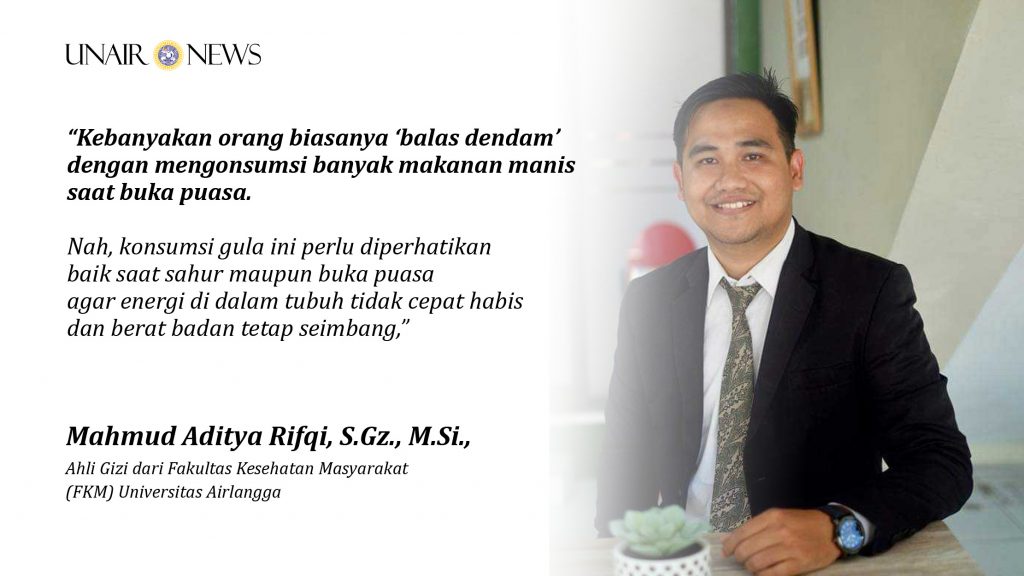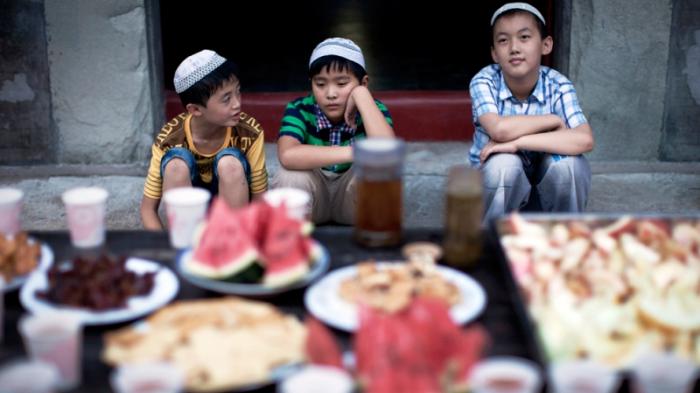UNAIR NEWS – Currently, Muslims are celebrating the month of Ramadan where they have to fast for a whole month. This of course will change the meal time from three times a day to twice a day, at dawn and dusk. Therefore, it is necessary to adjust the diet so the nutritional needs in the body are properly fulfilled.

In response to this, one of the nutritionists from Faculty of Public Health (FKM) Universitas Airlangga (UNAIR) Mahmud Aditya Rifqi, S.Gz., M.Si., shared tips for adjusting the diet so that the nutritional content in the body remains balanced even during fasting.
Sahur
To prepare the body to stay strong until iftar time, Mahmud conveyed that the main thing that needs to be considered at dawn is the intake of body fluids. Apart from getting enough water, Mahmud said that fluid intake can also be obtained from foods that contain water such as soup or vegetables with soup.
“Consumption of fruits such as apples, pears, watermelons and melons can be done to increase the supply of body fluids,” he added.
Furthermore, the lecturer born in Solok, West Sumatra, said that the consumption of foods that contain lots of fiber is also necessary at dawn. Remember, fiber can make the body stave off hunger longer.
“If on a normal day, the consumption of vegetables and fruit is usually less, during the fasting month, both of them need more because they contain lots of vitamins, minerals and fiber which can maintain fullness longer,” he explained.
Iftar
After emptying the stomach for a full day, the Nutritional Analysis lecturer said that we can start breaking our fast by eating simple foods first, such as drinking water and eating dates. According to Mahmud, the consumption of heavy foods containing carbohydrate, protein, and other complex substances should be done after Maghrib prayer.
“It is better if we don’t go directly to the main meal, we can start with a snack first,” he explained.
Furthermore, the lecturer also said that sugar consumption also needs to be maintained when breaking the fast.
“Most people usually ‘take revenge’ by eating lots of sweet foods when breaking their fast. Well, the consumption of this sugar needs to be considered both at sahur and iftar so the energy in the body does not run out quickly and body weight remains balanced, “he explained.
Managing water consumption
It cannot be denied that fasting causes dehydration because the body does not get fluid intake for more than 12 hours. To minimize dehydration, the 32-year-old lecturer said that the body must continue to consume 8-10 glasses of water every day. Mahmud gave an example of managing the time to drink at least 8 glasses of water in order to maintain an adequate water supply during fasting.
According to him, we should drink three glasses of water at dawn, one glass of water after waking up, one glass of water after sahur, and one glass of water before imsak. After that, one glass of water when we first break our fast. The rest, water consumption can be done after eating, before tarawih prayer, and before bed.
“The most important thing is to maintain a good diet during fasting, consume foods that contain lots of body fluids and fiber at sahur, and choose foods with carbohydrates, protein, vitamins, and other nutrients during iftar time,” he concluded. (*)
Author: Nikmatus Sholikhah
Editor: Feri Fenoria





